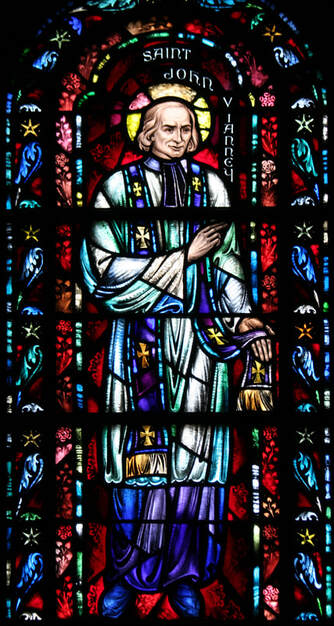 Sharon Mollerus [CC BY 2.0], via Wikimedia Commons
Sharon Mollerus [CC BY 2.0], via Wikimedia Commons Today is the feast of St. John Vianney, patron saint of parish priests. He was quite simply the best parish priest the world has ever known. He almost didn’t make it through seminary, however, because he kept flunking his Latin exams. They consulted the bishop, who asked: “Is this young Vianney pious? Does he say his rosary well? Is he devout to the Blessed Virgin?” “He is a model of piety,” replied the seminary rector. “Then ordain him!” Fr. Vianney was assigned a small country parish in the village of Ars. “There is not much love of God in that parish,” the bishop told him. “You will bring it there.” He got lost on the way to his new parish and asked a boy named Antoine for directions. Antoine pointed the way, and Fr. Vianney told him “you have shown me the way to Ars. I will show you the way to heaven.” When he got to Ars he found that very few people were going to Mass, so the young priest spent much of his first year praying in the church. Soon people began coming back to Mass, even if just to see a prayerful priest. They also came to confession in such great numbers that Fr. Vianney would spend up to 16 hours a day in his cramped, unheated confessional. Eventually 20,000 people a year were coming to him from all over Europe, such that the French government had to build a special railway to the little village of Ars. The devil told him once “Ah, Vianney: If there were three such priests as you, my kingdom would be ruined.” If you do not know this priest, you would do well to read about him, and then you can say to us priests, “why can’t you be a little more like the Cure d’Ars?”
Greed is Death
St. John Vianney died in 1559 a completely spent man. He lived on two or three hours’ sleep a night, and just a few potatoes each day, giving almost all his time and focus to saving souls. The saints whom God calls to such extraordinary lives witness to simplicity. We really don’t need much to live on, and surplus food, entertainment, and luxury distracts us from the one thing necessary. A woman asked John Vianney once “how do I get to heaven,” and he replied “straight as a cannonball.” All three readings today warn against greed, which is essentially a loss of focus on the one goal of life, which is heaven. Today we have access to virtually unlimited distractions and historically unparalleled levels of comfort and security. To get to heaven, St. Paul says we must “put to death the parts of you that are earthly: immorality, impurity, and the greed that is idolatry.” Jacopone da Todi, in 1265, described it even more acerbically: “obsessive avarice, a worm that knows no rest, erodes the mind with endless preoccupations.” It breeds discontent and dissatisfaction; it poisons our inner thoughts with envy and resentment; greed is a cancer that spreads its fibrous tentacles into every dimension of our lives. But the Bible gives a cure, which I will show you at the end of this homily.
God calls in the debt
The first reading from the book of Qoheleth declares rather drearily “Vanity of Vanities.” Nothingness eventually claims everything on earth. All the prettiest things in life are no more than shiny bubbles that disappear within a few seconds. Don’t worship any bubble, because your bubble will burst soon enough. In Jesus’ parable, a man has worked very hard to amass so many things that he has to build bigger barns to store them: Mister Storage. Does anyone in this church not have stuff in storage somewhere? In Jesus’ parable, God “demands” the life of that man, just as he was moving his stuff into bigger barns. The literal Hebrew words are that God “calls in the debt.” Our possessions, and our very lives, are on loan from God, and he can call in the debt at any time. So how do I free myself of greed? “Put to death, then, the greed that is idolatry,” St. Paul writes. We kill greed by giving a portion of what we have been given away. When I tithe a portion of my goods, I declare my freedom from those things. The same goes for time: if I give God an hour a week in quiet prayer, or the rosary, or daily Mass, He gives me many more hours in return. I don’t know how it works, but I know it works. “Don’t worry about money,” Mother Teresa said. “God has lots of it.” So do we believe in the Prosperity Gospel? You bet, but we want to be prosperous in what matters to God. Like St. John Vianney, we want to lay hold of heaven with both hands. We will not let go of God no matter what, even if that means letting go of a lot of other things that separate us from Him.


 RSS Feed
RSS Feed